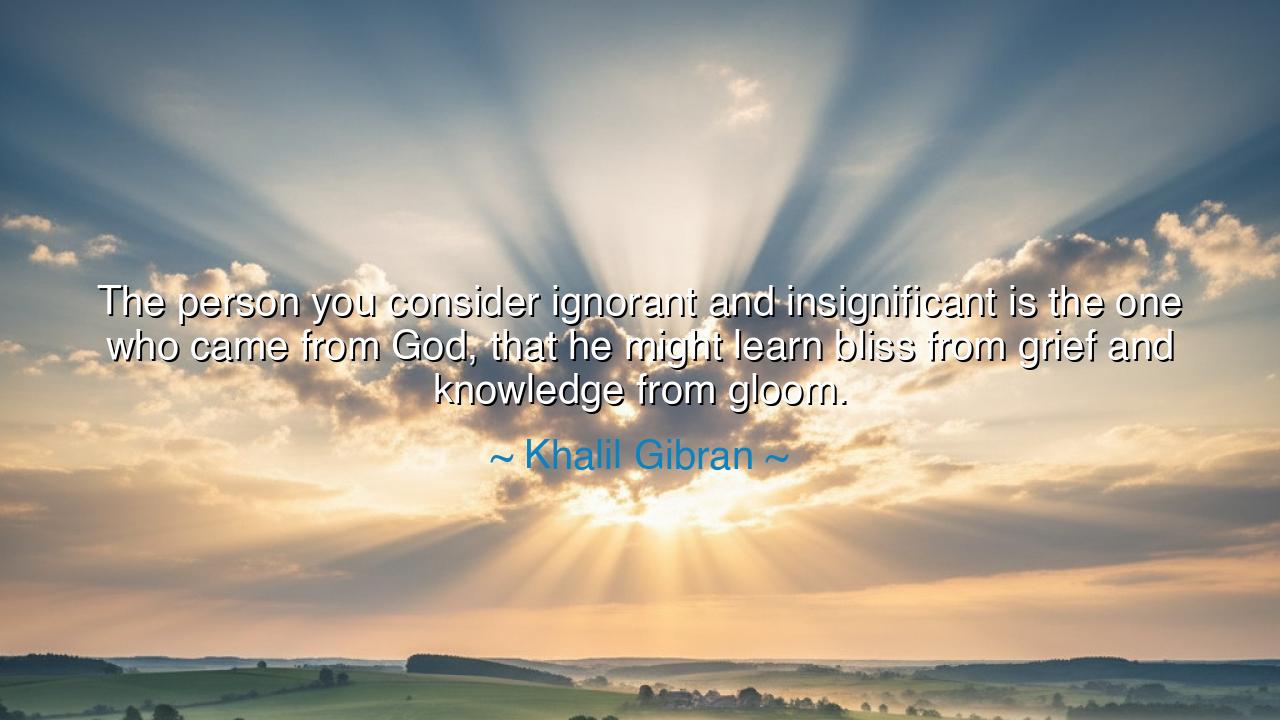
The person you consider ignorant and insignificant is the one who
The person you consider ignorant and insignificant is the one who came from God, that he might learn bliss from grief and knowledge from gloom.






"The person you consider ignorant and insignificant is the one who came from God, that he might learn bliss from grief and knowledge from gloom." Thus spoke Khalil Gibran, the poet of Lebanon whose words flow like rivers between heaven and earth. His teaching is a reminder to the proud and a comfort to the humble: that every soul, no matter how small it may appear in the eyes of men, carries within it the spark of the Divine. The ignorant one, the insignificant one, is not cast aside by the heavens, but is sent into the world to walk a holy path of transformation—turning sorrow into wisdom, and darkness into light.
The meaning is profound. To call a man ignorant is to judge only what the eye can see: his knowledge of books, his manner of speech, his station in life. Yet Gibran reminds us that the soul of that man is not yours to measure. Perhaps his ignorance is but the soil from which wisdom will one day bloom. Perhaps his insignificance is the disguise of one destined for greatness. For from grief, a soul may learn bliss more deeply than one who has never suffered. And from the shadows of gloom, a heart may gain knowledge brighter than the sun.
History bears witness to this law. Consider the tale of Abraham Lincoln, who as a boy was considered poor, unremarkable, and unlearned, raised in a log cabin far from the halls of learning. Many in his youth would have called him insignificant. Yet through years of hardship—through grief at the loss of loved ones, through the gloom of repeated failure—he gathered strength of spirit and depth of understanding. In time, he rose to lead a nation through its greatest trial, his words of humility and resolve echoing across generations. What seemed ignorance was transformed into wisdom, what seemed insignificance became destiny.
The ancients, too, spoke of this mystery. The Greeks told how Hercules gained his place among the gods not by ease, but by labors that broke his body yet purified his soul. In the East, the Buddha himself left behind the trappings of wealth, embracing grief, hunger, and loss before he found enlightenment beneath the Bodhi tree. Again and again, the pattern appears: from suffering arises wisdom, from humility springs greatness, from gloom comes knowledge.
Gibran’s words also carry a warning. To despise another for their seeming ignorance is to risk despising one whom God has chosen as His pupil. The soul you dismiss may be closer to truth than you, for their struggles may be the very crucible that purifies them. Better, then, to look upon all with compassion, to see in each person a fellow traveler in the divine school of life. For the roles of teacher and student shift with time—today’s outcast may become tomorrow’s sage.
The lesson for us is this: do not measure others by worldly standards of wealth, education, or status. Look deeper. Every person carries within them the potential to turn sorrow into strength. And in your own life, when grief falls upon you, do not curse it; when gloom surrounds you, do not despair. Instead, ask what wisdom lies hidden within the trial, what bliss may yet grow from your pain. For suffering, though bitter, is often the soil in which the sweetest fruits are born.
Practically, this means we must cultivate both humility and compassion. Speak gently to those you deem unlearned, for they too are children of God. Honor the struggles of the poor and the unnoticed, for their path may be holier than your own. And when hardship strikes you, do not waste it with bitterness; record its lessons, grow from it, let it deepen your soul. By this practice, you will walk the path of transformation that Gibran so beautifully describes.
So, children of tomorrow, remember: the ignorant one, the insignificant one, is no less a vessel of divinity than the wise and the powerful. Honor them, learn from them, and see in their grief and gloom the same lessons life may one day give you. For in the school of existence, all are pupils, all are tested, and all are capable of becoming radiant with knowledge born of sorrow and bliss born of pain. And when you see this truth, pride will melt away, and you will stand in awe of the hidden greatness of the human soul.






AAdministratorAdministrator
Welcome, honored guests. Please leave a comment, we will respond soon